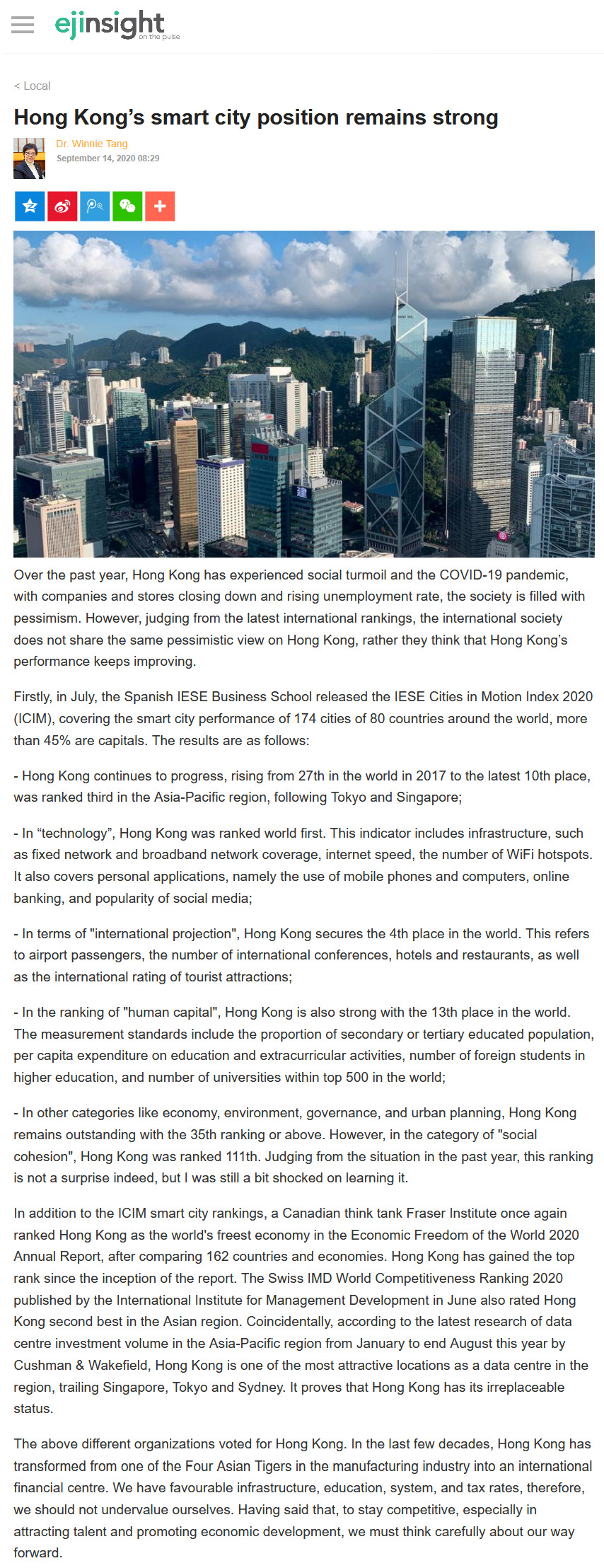網上版請按此

Hong Kong's smart city position remains strong
Over the past year, Hong Kong has experienced social turmoil and the COVID-19 pandemic, with companies and stores closing down and rising unemployment rate, the society is filled with pessimism. However, judging from the latest international rankings, the international society does not share the same pessimistic view on Hong Kong, rather they think that Hong Kong's performance keeps improving.
Firstly, in July, the Spanish IESE Business School released the IESE Cities in Motion Index 2020 (ICIM), covering the smart city performance of 174 cities of 80 countries around the world, more than 45% are capitals. The results are as follows:
- Hong Kong continues to progress, rising from 27th in the world in 2017 to the latest 10th place, was ranked third in the Asia-Pacific region, following Tokyo and Singapore;
- In "technology", Hong Kong was ranked world first. This indicator includes infrastructure, such as fixed network and broadband network coverage, internet speed, the number of WiFi hotspots. It also covers personal applications, namely the use of mobile phones and computers, online banking, and popularity of social media;
- In terms of "international projection", Hong Kong secures the 4th place in the world. This refers to airport passengers, the number of international conferences, hotels and restaurants, as well as the international rating of tourist attractions;
- In the ranking of "human capital", Hong Kong is also strong with the 13th place in the world. The measurement standards include the proportion of secondary or tertiary educated population, per capita expenditure on education and extracurricular activities, number of foreign students in higher education, and number of universities within top 500 in the world;
- In other categories like economy, environment, governance, and urban planning, Hong Kong remains outstanding with the 35th ranking or above. However, in the category of "social cohesion", Hong Kong was ranked 111th. Judging from the situation in the past year, this ranking is not a surprise indeed, but I was still a bit shocked on learning it.
In addition to the ICIM smart city rankings, a Canadian think tank Fraser Institute once again ranked Hong Kong as the world's freest economy in the Economic Freedom of the World 2020 Annual Report, after comparing 162 countries and economies. Hong Kong has gained the top rank since the inception of the report. The Swiss IMD World Competitiveness Ranking 2020 published by the International Institute for Management Development in June also rated Hong Kong second best in the Asian region. Coincidentally, according to the latest research of data centre investment volume in the Asia-Pacific region from January to end August this year by Cushman & Wakefield, Hong Kong is one of the most attractive locations as a data centre in the region, trailing Singapore, Tokyo and Sydney. It proves that Hong Kong has its irreplaceable status.
The above different organizations voted for Hong Kong. In the last few decades, Hong Kong has transformed from one of the Four Asian Tigers in the manufacturing industry into an international financial centre. We have favourable infrastructure, education, system, and tax rates, therefore, we should not undervalue ourselves. Having said that, to stay competitive, especially in attracting talent and promoting economic development, we must think carefully about our way forward.
Dr. Winnie Tang
Adjunct Professor, Department of Geography, Faculty of Social Sciences and Faculty of Architecture, The University of Hong Kong